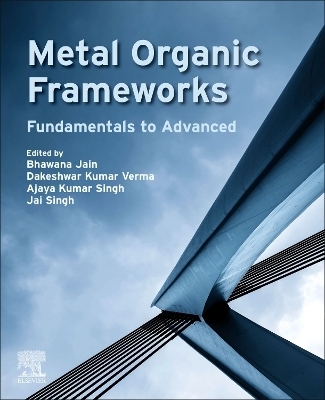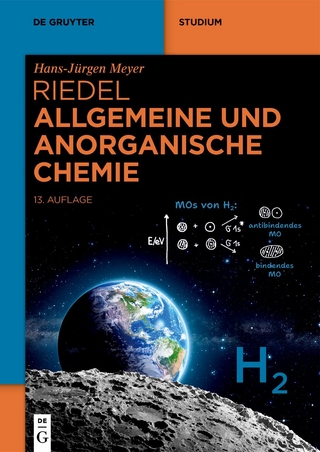
Metal Organic Frameworks
Elsevier - Health Sciences Division (Verlag)
978-0-443-15259-7 (ISBN)
Dr Bhawana Jain received her doctorate degree in year 2011 from Govt. V. Y. T. PG. Autonomous College, Durg (C.G.), India. She had fellowships from UGC (Postdoctoral Fellowship for Women) and worked as a postdoctoral fellow at Govt. V.Y.T. PG. Autonomous College, Durg (C.G) India. She has 15 years of Research experience. She is actively engaged in the development of nanomaterials (CeO2, graphene oxide, ZnO, CuO, NiO, etc.), based nanobiocomposite for wastewater treatment containing different pollutants, dyes, drug, organic matter etc. She has publihed 32 international research and review articles including book chapters, in an internationally reputed press for publications, namely Elsevier, Springer Nature, Wiley, ACS. With total Citations as <500, h-index being 13, i-index 15. She received Certificate of Merit from American Chemical Society, USA in 2016. Currently, she is actively engaged in the research and development of Organic-inorganic metal halide perovskite for solar cell device. Dakeshwar Kumar Verma is Assistant Professor of Chemistry at Government Digvijay Autonomous Postgraduate College, Rajnandgaon, India. His research is mainly focused on the preparation and design of organic compounds for various applications. Dr Ajaya Kumar received his Ph.D. degree on Kinetics and oxidation from University of Allahabad Uttar Pradesh, India. His research focuses on multiple areas such as developing strategies, based on synthesis, characterization, properties modification, design, fabrication, characterization of nanostructures, quantum dots, perovskite materials and photocatalyst for waste water treatment, and advanced oxidation processes. He has received various awards a Certificate of Merit in 2016 from American Chemical Society (USA) and is also the member of various societies. Dr. Jai Singh is an Associate Professor at Guru Ghasidas Vishwavidyalaya's Department of Pure and Applied Science (Central University). He received his doctorate in the subject of II-VI oxide nanomaterials from Banaras Hindu University in Varanasi, India. Soon after completing his Ph.D., he joined Cologne University in Cologne, Germany, to do post-doctoral research in the areas of 2D materials, Transparent Conducting Oxide (TCO) materials, and Energy materials, and then moved to Pusan National University in Busan, South Korea, and Sejong University in Seoul, South Korea, to do the same. He has received several prestigious national and international awards, including the GATE Fellowship from the Ministry of Human Resource Development, the CSIR-Junior Research Fellowship and Senior Research Fellowship from the Council of Scientific and Industrial Research, the Postdoctoral Fellowship from Busan National University, the NSC Postdoctoral Fellowship from Taiwan, and the Visiting Fellowship from Cologne University in Germany.
Part 1: General Inception, synthesis and modification
1. Metal organic frameworks (MOFs):Current trends, challenges and future prospects
2. Metal organic frameworks (MOFs) constructed from Biomolecular Building Blocks
3. Natural and synthetic Polymer-Based Metal organic frameworks (MOFs)
4. Metal organic frameworks (MOFs) and their composites with metal ions
5. Paramagnetic metal organic frameworks (MOFs) nanocomposite
6. Alkaline Earth Metal-Based Metal–Organic Frameworks (MOFs)
7. Organosulfonate-Based Metal-Organic Frameworks
8. Lanthanum based metal-organic frameworks (MOFs)
9. Bulk synthesis and Shaping of Metal-Organic Frameworks
10. Platinum Group based Metal–Organic Frameworks (MOFs) nanocomposites
11. Stability of metal organic frameworks (MOFs)
12. Different effective strategies to develop active sites in Metal–Organic Frameworks (MOFs)
13. Metal organic frameworks Linkers: Optical Functionality and Chiral Linker
14. Functional Linkers for Electron-Conducting MOFs and Extended Linkers for Ultrahigh Surface Area Metal–Organic Framework
Part 2: Experimental and Theoretical insights
15. ANN and QSAR approaches towards metal organic frameworks (MOFs)
16. Impact of molecular simulations in the area of metal organic frameworks (MOFs)
17. Computational Screening of MOFs for environmental protection
18. The Gas Adsorption Mechanisms in Metal–Organic Frameworks from Classical Molecular Simulations
19. Metal organic frameworks (MOFs): Computational modeling in catalysis
20. Metal organic frameworks (MOFs): Computational modeling in ionic compound
21. DFT based molecular modelling for MOFs
Part 3: Significance and Importance
22. Metal-Organic Frameworks (MOFs) for Energy Storage Supercapacitor Application
23. Metal-organic frameworks (MOFs) for reasonable carbon dioxide fixation and electrocatalytic carbon dioxide reduction
24. Metal-organic frameworks (MOFs) for Drug delivery
25. Metal-Organic Frameworks (MOFs) for wastewater treatment
26. Metal-Organic Frameworks (MOFs) as an efficient photocatalysts
27. Metal-Organic Frameworks (MOFs) for ion-exchange
28. Emerging role of Metal Organic Frameworks (MOFs) in renewable energy and fuel storage
29. Thermo-mechanical and anti-corrosion characteristics of metal-organic frameworks (MOFs)
30. Metal organic Frameworks (MOFs) and Biomacromolecules for Biomedical Applications
31. Metal organic Frameworks (MOFs) for Biosensing application
32. Metal organic frameworks (MOFs) for gas purification and gas adsorption
33. Role of Metal organic frameworks (MOFs) in organic reactions
34. Metal organic frameworks (MOFs) as an enzyme in catalytic reaction
35. Toxicity of Metal–Organic Frameworks (MOFs) in living system
| Erscheinungsdatum | 27.04.2024 |
|---|---|
| Verlagsort | Philadelphia |
| Sprache | englisch |
| Maße | 191 x 235 mm |
| Gewicht | 450 g |
| Themenwelt | Naturwissenschaften ► Chemie ► Anorganische Chemie |
| ISBN-10 | 0-443-15259-4 / 0443152594 |
| ISBN-13 | 978-0-443-15259-7 / 9780443152597 |
| Zustand | Neuware |
| Informationen gemäß Produktsicherheitsverordnung (GPSR) | |
| Haben Sie eine Frage zum Produkt? |
aus dem Bereich


